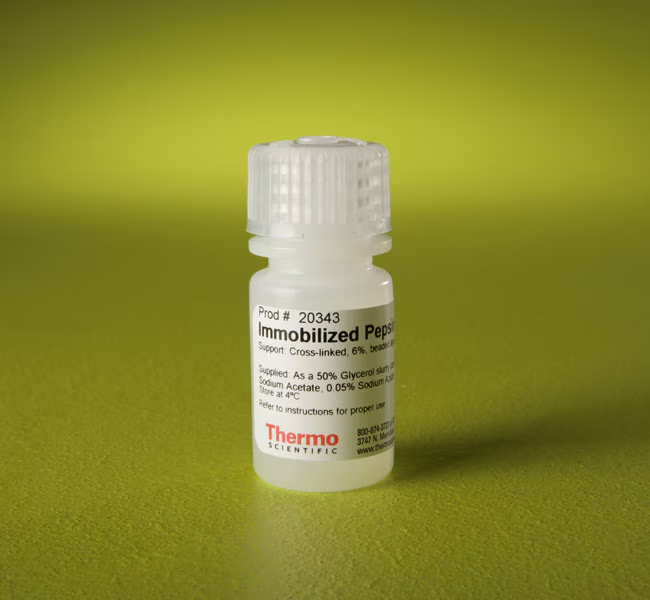
Thermo Scientific Pierce Immobilized Pepsin Agarose consists of an acidic endopeptidase (pepsin) that has been immobilized onto beaded agarose resin to enable generation and purification of Fab and F(ab')2 fragments from antibodies.
Pepsin is a nonspecific acidic endopeptidase produced in an inactive precursor form (pepsinogen) in the mucosal lining of the stomach of vertebrates. There are several pepsins, each with a molecular weight of 35,000 and an optimum pH of 1-3; at pH >6, the enzyme is permanently inactivated. Pepsin has broad substrate specificity. It cleaves proteins preferentially at carboxylic groups of aromatic amino acids such as phenylalanine, tryptophan and tyrosine. It will not cleave at bonds containing valine, alanine or glycine. Cleavage at other residues occurs with varying efficiency.
Pepsin and other proteolytic enzymes are used in the laboratory analysis of various proteins. Pepsin and papain are often used to generate antibody fragments. Papain is used to cleave antibodies into Fab fragments, which contain a single antigen-binding domain. Pepsin is used to generate F(ab')2 fragments by removing only that portion of the Fc domain beyond the hinge region. The resulting F(ab')2 fragments are composed of two antibody-binding Fab' fragments connected by disulfides in the hinge region.
Immobilized pepsin can be substituted for free pepsin in any application, and is advantageous because it virtually eliminates autolysis, eliminates contamination of a sample with the protease and allows control of the digestion by removing the pepsin. Immobilized pepsin is also more stable against heat-induced denaturation, resulting in longer maintenance of activity. The F(ab')2 Preparation Kit contains immobilized pepsin, other necessary reagents and an optimized protocol for human, rabbit and mouse antibody digestion.
| Code | Description |
|---|---|
| 20343 | Catalog Number: 20343 |

